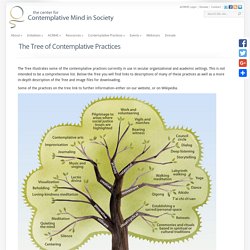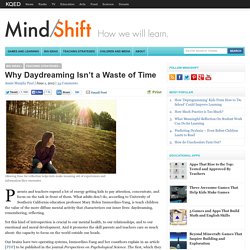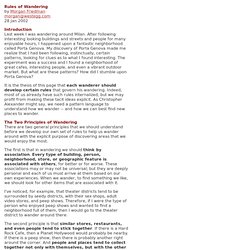

Did You Know 3.0 (Officially updated for 2012) HD. The Tree of Contemplative Practices. The Tree illustrates some of the contemplative practices currently in use in secular organizational and academic settings.

This is not intended to be a comprehensive list. Below the Tree you will find links to descriptions of many of these practices as well as a more in-depth description of the Tree and image files for downloading. Some of the practices on the tree link to further information–either on our website, or on Wikipedia. © The Center for Contemplative Mind in Society Concept & design by Maia Duerr; illustration by Carrie Bergman Understanding the Tree. What Can You Really Know? by Freeman Dyson. Why Does the World Exist? : An Existential Detective Story. The Higgs Boson, a Blip That Speaks of Our Place in the Universe.
Blogs, Articles and Videos from the World's Top Thinkers and Leaders. A Philosophy Podcast and Philosophy Blog. Why Daydreaming Isn’t a Waste of Time. Allowing time for refleciton helps kids make meaning out of experiences and information they encounter.

Parents and teachers expend a lot of energy getting kids to pay attention, concentrate, and focus on the task in front of them. What adults don’t do, according to University of Southern California education professor Mary Helen Immordino-Yang, is teach children the value of the more diffuse mental activity that characterizes our inner lives: daydreaming, remembering, reflecting. Yet this kind of introspection is crucial to our mental health, to our relationships, and to our emotional and moral development. And it promotes the skill parents and teachers care so much about: the capacity to focus on the world outside our heads. Our brains have two operating systems, Immordino-Yang and her coauthors explain in an article [PDF] to be published in the journal Perspectives on Psychological Science.
Rules for Wandering. Rules of Wandering by Morgan Friedmanmorgan@westegg.com 28 Jan 2002 Introduction Last week I was wandering around Milan.

After following interesting looking buildings and streets and people for many enjoyable hours, I happened upon a fantastic neighborhood called Porta Genova. My discovery of Porta Genova made me realize that I had been following, instinctually, certain patterns, looking for clues as to what I found interesting. The experiment was a success and I found a neighborhood of great cafes, interesting people, and even a vibrant outdoor market.
But what are these patterns? The Art of Living: A Free Stanford Course Explores Timeless Questions. The Century of the Self. Study: More educated tend to be more religious, by some measures. By Jim Kavanagh, CNN People tend to become less religious as they become more educated, right?

Not necessarily, according to a new study. After analyzing data from a large national survey, University of Nebraska-Lincoln sociologist Philip Schwadel found that people actually tend to become more religious - by some definitions, at least - as they further their education. “It all falls down to what you consider to be religious,” said Schwadel, an assistant professor at the University of Nebraska-Lincoln.
“If it’s simply attending religious services, then no. “But if it’s saying the Bible is the literal word of God and saying that only one religion is the true religion, then they are less religious,” he continued. Schwadel used data from the highly regarded General Social Survey, a cumulative and nationally representative survey conducted by the National Opinion Research Center at the University of Chicago biannually since 1972. Schwadel found that with each additional year of education: Heavenly discoveries, earthly inventions.
The Hubble Space Telescope provided an image of a stellar jet in the Carina Nebula. Meg Urry: Astronomers found body of water 140 trillion times the volume of our oceansIt orbits a black hole, she says, it's 12 billion light years away, and a boon to research Urry: Physics behind practical applications like electronics, computers, CAT scanners, MRIsUrry says it's crucial to pursue science for its own sake; it often solves practical problems Editor's note: Meg Urry is the Israel Munson professor of physics and astronomy and chair of the Department of Physics at Yale University. She is also the director of the Yale Center for Astronomy and Astrophysics.
SuperCooperators - By Martin A. Nowak. “SuperCooperators” (written with Roger Highfield, editor of New Scientist magazine) is an absorbing, accessible book about the power of mathematics. Unlike Darwin with his brine bottles and pigeon coops, Nowak aims to tackle the mysteries of nature with paper, pencil and computer. By looking at phenomena as diverse as H.I.V. infection and English irregular verbs, he has formally defined five distinct mechanisms that have helped give rise to cooperative behavior, from the first molecules that joined to self-replicate, to the first cells that formed multicellular organisms, all the way to human societies, which exhibit a degree of cooperation unmatched in all creation.
Everything is a Remix. The Stranger. Ted Talks. In Texas, young Hindus want to Americanize ancient faith. By Dan Gilgoff, CNN.com Religion Editor Houston, Texas (CNN) – In many ways, 29-year-old Rishi Bhutada is a traditional Hindu, not so different from his Indian-born parents.

An officer at his dad’s pipefitting company, Texas-born Bhutada had an arranged marriage in India three years ago and then brought his wife back to his hometown, where they recently welcomed a son. I Love you and Buddha too. Song by Mason Jennings Jack Johnson - Buddha Dzogchen Ponlop Rinpoche. Jamyang Buddhist Centre. The Biggest Big Question of All. Effing the Ineffable. 'The Things They Carried,' 20 Years On. Morality. Barefoot In the head. Home.